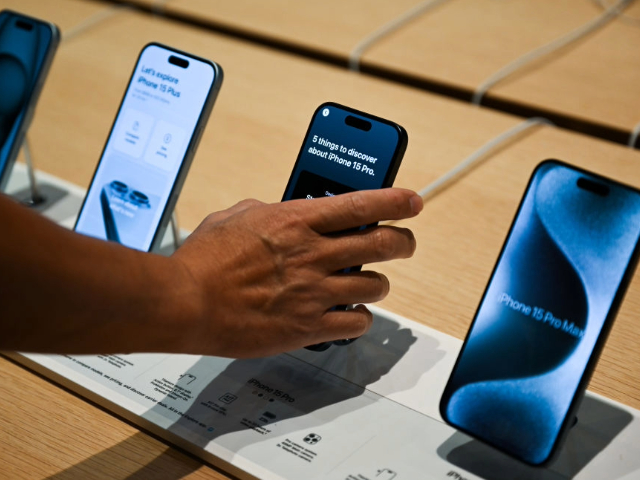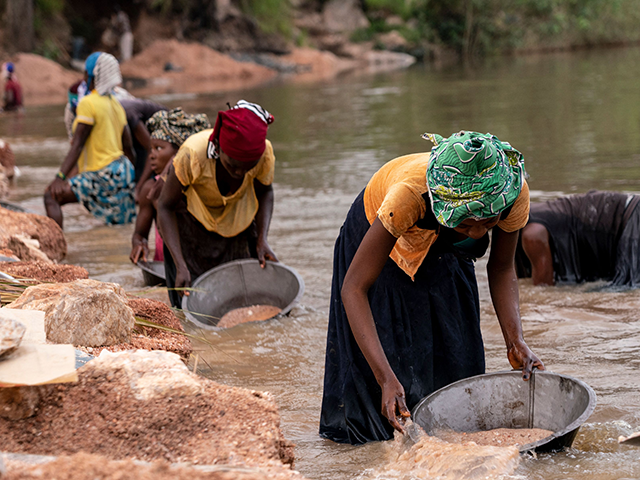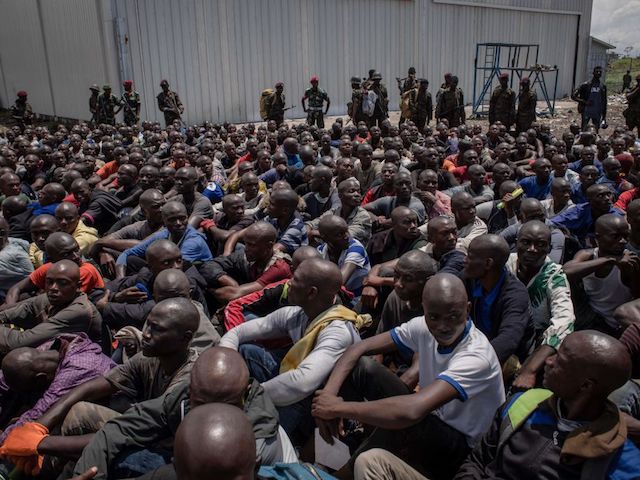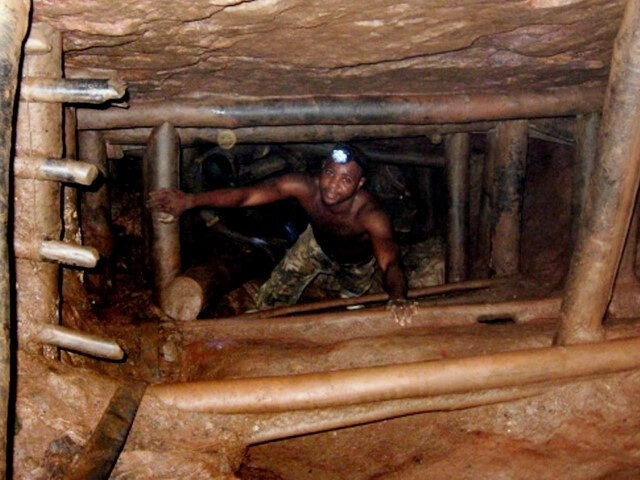Lawyers for the government of the Democratic Republic of Congo (DRC) sent Apple a cease-and-desist order Thursday threatening legal action unless the tech giant stops using allegedly illegally exported minerals harvested from the DRC’s conflict zones and smuggled through Rwanda.
According to Agence France-Presse (AFP), which reviewed the cease-and-desist letter prepared by French lawyers working for the Congolese government, Apple allegedly “sold technology made with minerals sourced from a region whose population is being devastated by grave human rights violations.” Those violations include “sexual violence, armed attacks and widespread corruption.”
“The iPhones, Mac computers and accessories that Apple sells to its customers around the world rely on supply chains that are too opaque, and that are tainted by the blood of the Congolese people,” the letter said.

Customers check new iPhone 15s as people lined up to buy the newly launched iPhone 15 and other Apple products outside of the Apple store in Palo Alto, California, on September 22, 2023. (Tayfun Coskun/Anadolu Agency via Getty)
“Apple has consistently relied on a range of suppliers that buy minerals from Rwanda, a mineral-poor country that has preyed upon the DRC and plundered its natural resources for nearly three decades,” the DRC’s lawyers charged.
“Apple seems to rely mainly on the vigilance of its suppliers and their commitment to respect Apple’s code of conduct,” they said, strongly suggesting Apple’s faith is misplaced.
After writing the letter to Apple, the French law firm of Amsterdam & Partners issued a statement that accused the global electronics industry of deliberately turning a blind eye to human rights abuses because it requires crucial minerals at bargain prices.
“The world’s eyes are wide shut: Rwanda’s production of key 3T minerals is near zero, and yet big tech companies say their minerals are sourced in Rwanda,” they said.
The “3T” minerals are tantalum, tin, and tungsten, all of which are vital to electronics manufacturing. Another common abbreviation is 3TG, which refers to tantalum, tin, and gold.
The DRC suspects Apple is using tin, tungsten, titanium, and gold extracted from its mineral-rich but conflict-wracked Great Lakes region. The eastern Congo has some of the richest mineral deposits in the world, but unfortunately it also has M23.

Artisanal miners collect gravel from the Lukushi river searching for cassiterite, an ore of tin, on February 17, 2022 in Manono, the Democratic Republic of Congo. (JUNIOR KANNAH/AFP via Getty)
M23, also known as the “March 23 Movement,” is the current name for a violent extremist movement that dates back to the Rwandan genocide of the mid-1990s. The movement was largely founded by Tutsis, the ethnic group that was slaughtered wholesale in Rwanda by their tribal rivals, the Hutus. Tutsis in the Congo were radicalized by the horror in Rwanda and became easy marks for a succession of extremist leaders.
After a few quiet years, the long-running insurrection in the eastern Congo came roaring back in 2016 under the new name Mouvement du 23 Mars, a name chosen to mock a 2009 peace deal that was supposed to put an end to their rebellion. In 2021, the insurrectionists began conquering entire villages and fighting pitched battles against the DRC government, which accused Rwanda of supporting the rebels in a bid to break up the Congo and grab territory for themselves – especially the territory with all those valuable mines.

Hundreds of volunteers sit at Goma International Airport before boarding a plane that will take them to a training center after responding to Democratic Republic of Congo’s President Felix Tshisekedi’s call to join the army to go to the front lines to fight against the M23 rebellion (March 23 Movement) in Goma, Democratic Republic of Congo, on November 14, 2022. (Guerchom Ndebo / AFP) (Photo by GUERCHOM NDEBO/AFP via Getty)
Rwanda was unquestionably involved in founding M23 under President Paul Kagame, an ethnic Tutsi and an accused war criminal, who took power in 2000 and remains in control of Rwanda to this day. The U.N. Security Council has assessed that Rwanda is not only supporting the M23 rebels, but occasionally sending troops to fight alongside them.
The M23 rebels are noted for their intense savagery, and their insurrection has turned the eastern Congo into one of the world’s worst humanitarian disasters. In March, the United Nations warned that both the security and humanitarian situations in the eastern DRC have grown steadily more “disastrous” as M23 makes “significant advances,” displacing thousands of civilians in the process. The U.S. State Department now describes M23 as a “Rwanda-backed” group, and fears are growing that relations between the DRC and Rwanda could deteriorate into all-out war.
For its part, Rwanda claims it was obliged to intervene in the eastern Congo because the DRC military has been infiltrated by another terrorist group known as the Democratic Forces for the Liberation of Rwanda (FDLR). The United States government recognizes FDLR as a real threat, but strongly disapproves of Rwanda supporting M23 as a countermeasure.
This is the bloody stew into which the DRC poured its allegations against Apple for using “blood minerals.” The DRC suspects minerals are being extracted from the conflict zone, smuggled across the border into Rwanda, and then pumped into the global supply chain. The profits from this trade are allegedly helping to finance the M23 insurrection.
“In Congo, people have been dying for 30 years as a result of illegal mining. We want clarification on the sources of supply for major technology companies, in particular Apple, to verify whether they are acquiring minerals produced in completely illegal conditions,” DRC spokesman Patrick Muyaya said on Thursday.
The letter sent by DRC lawyers to Apple cited a 2022 report from a nonprofit group called Global Witness that accused Apple of implementing “few meaningful mitigation measures” against using smuggled minerals.
The Global Witness report noted the enormous hunger of the worldwide electronics industry for 3T minerals and said the practice of smuggling those minerals from Congo through Rwanda to legitimize purchases by big corporations is so widespread that the Great Lakes region is essentially a giant “laundromat” for blood minerals and dirty money.
Making the situation even worse, Global Witness found many of the eastern Congo’s mines are under the control of “abusive militias” that employ child labor, among their other human rights violations.
The 2022 report was highly critical of the International Tin Supply Chain Initiative (ITSCI), an organization established by mineral trade groups to ensure minerals are not harvested with child labor or sourced from conflict zones. In their letter to Apple the DRC’s lawyers echoed criticisms that the ITSCI is too lax in enforcement and too trusting of compromised governments like Rwanda’s.
The DRC letter asked Apple to answer probing questions about its mineral supply chain within three weeks and promised a fresh report on the “laundering” of Congo minerals through Rwanda would be published around that time. AFP suspected the DRC might have similar questions for other electronics firms that obtain minerals from the region, including Tesla, Intel, and Samsung.
Apple responded that it does conduct “due diligence” on its mineral supply chain, and it sees “no reasonable basis for concluding that any of the smelters or refiners of 3TG determined to be in our supply chain as of December 31, 2023, directly or indirectly financed or benefited armed groups in the DRC or an adjoining country.”

COMMENTS
Please let us know if you're having issues with commenting.